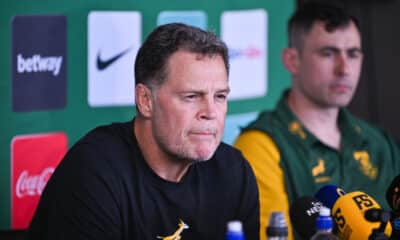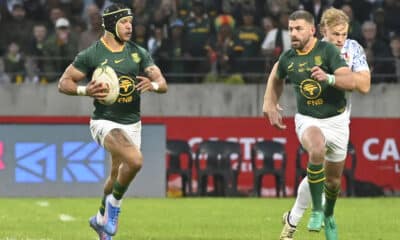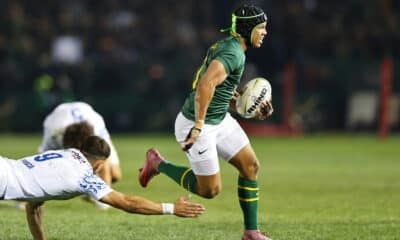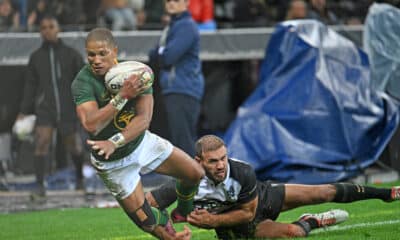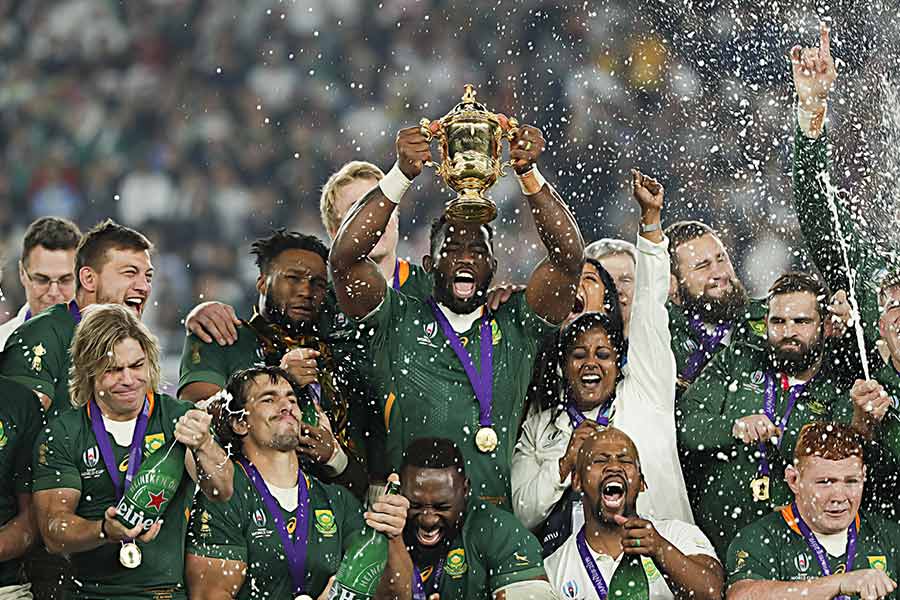
23 December 2019, by: Quintin van Jaarsveld
Springbok Decade Series: 2019
The past decade saw the Springboks rise from record lows to ultimate triumph, writes Quintin van Jaarsveld.
The Springboks’ journey over the past 10 years, rising from the ashes to World Cup glory in 2019, is akin to climbing Everest. The very reputation of Springbok rugby hung in the balance after the men in Green and Gold plummeted to unprecedented lows. Record losses equalled red alert and avalanche after avalanche threatened to bury the Boks for good.
With true South African grit, however, the men in Green and Gold persevered. Problems persisted, but every time they got knocked down, they picked themselves up and dusted themselves off. Instead of waning, they grew stronger and eventually turned the corner. Emerging from the shadows, there was hope once more, the summit in sight, albeit from afar.
Hope inspired heroics, and with Rassie Erasmus and Siya Kolisi leading the way, the Springboks scaled the peak in remarkable fashion. Overcoming the odds, the class of 2019 clinched the coveted Webb Ellis Cup, planting their flag atop rugby’s Everest and breathing the rarefied air reserved for world champions.
On the doorstep of a new dawn, we take a trip down memory lane in a 10-part series chronicling the decade that was for Springbok rugby.
GET THE ADVANTAGE WITH OUR RUGBY BETTING OFFERS
Extensive pre-match and live in-play markets on every game.
Our legendary BET Boosts to give you extra value on every game!
Exclusive to BET.co.za customers.
Having returned to their roots in their first season under Rassie Erasmus, the Springboks regained much of their menacing mojo and recorded a rare win over the All Blacks on New Zealand soil, but they were still far from the finished product, as their 7-7 win-loss record showed.
With just five fixtures before the World Cup kicked off in Asia for the first time, the Boks had a lot of ground to cover in a short amount of time. Worryingly, inconsistency hampered all four of South Africa’s Super Rugby franchises. The Bulls and Sharks reached the play-offs but were dumped out at the quarter-final stage after coming up short abroad against the Hurricanes and Brumbies, a consequence of their erratic nature throughout the season.
As a result, few gave the Boks a chance of clinching the truncated Rugby Championship, with the All Blacks heavily favoured to continue their dominance in the Southern Hemisphere showpiece. Erasmus, however, had a trick up his sleeve. The Bok mentor employed a divide and conquer tactic, splitting his squad into two teams.
The bulk of the strongest possible line-up jetted off to New Zealand early to give themselves ample time to acclimate ahead of the Round Two blockbuster, a rematch of the 2018 Wellington war, while a ‘B’ team stayed in South Africa for the tournament opener against Australia.
It was yet another bold move by Erasmus, one that proved to be a masterstroke. The faith Erasmus showed in the second-stringers galvanised the group and they repaid it in full. Debutant scrumhalf Herschel Jantjies starred, scoring two tries in a Man of the Match performance as the hosts walloped the Wallabies 35-17 at Ellis Park.
Having to counter-act Erasmus’ two-team tactic, Steve Hansen took an understrength All Blacks team to Buenos Aires where they narrowly avoided a shock upset against a passionate Pumas side, eking out a 20-16 win. When they locked horns with the Boks in the long-awaited clash at the Cake Tin, it was the visitors who looked the sharper side. The hosts, however, made better use of their scoring opportunities to take control and in the end, it took a moment of magic for red-hot rookie Jantjies to score a last-minute try to salvage a 16-all draw.
The split-squad tactic had paid off as the Boks topped the table going into the final round, knowing a bonus-point victory over the winless Pumas in Salta would assure them of their maiden Rugby Championship title. A fired-up, full-strength side annihilated Argentina 46-13 – the biggest winning margin of the Erasmus era to that point – as they ended a 10-year trophy drought and cemented themselves as legitimate World Cup contenders.
Siya Kolisi, who had missed the triumphant Rugby Championship campaign due to injury (Eben Etzebeth and Duane Vermeulen split the captaincy duties), returned the following week for the stand-alone encounter against the Pumas in Pretoria, where a mixed South African side prevailed 24-18.
Given Erasmus’ meticulous nature, there were no surprises when he announced his World Cup squad, with Erasmus sticking to the group he’d groomed since the early stages of his stint as head coach. A fit-again Kolisi would lead the most racially-transformed Bok World Cup squad into battle, with the tournament breaking new ground in Japan.
Erasmus revealed he would stick to his two-team approach at the World Cup. In another calculated risk, the Boks were the first foreign team to touch down in the Land of the Rising Sun, with Erasmus explaining it would aid the process of adapting to the searing heat and humidity. It was a big ask, though, as it meant they would have to spend a full nine weeks in Japan to capture the crown.
In their final warm-up match against Japan, they got their first taste of the challenging conditions and were able to exorcise the demons of the shock loss in Brighton in 2015 with a dominant 41-7 win. All the hard work up to that point led up to their blockbuster World Cup opener against the defending-champion All Blacks. Unfortunately for them, Erasmus’ charges failed to execute on the day and succumbed 23-13 in Yokohama. The mountain just became that much steeper, as no team in history had ever won the tournament after losing a pool match.
They bounced back from the disappointing defeat with emphatic wins over Namibia (57-3), Italy (49-3) and Canada (66-7) to finish behind the treble-chasing Kiwis as Pool B runners-up, setting up a massive quarter-final showdown with hosts Japan, who’d qualified for the playoffs for the first time with an awe-inspiring unbeaten run that included historic wins over Ireland (19-12) and Scotland (28-21).
With their forwards-based, slow poison style, the Boks ended the Brave Blossoms’ fairy-tale run with a convincing 26-3 win in which tactical general Faf de Klerk found his form and delivered a Man of the Match performance. The following week, it was his halfback partner Handré Pollard’s turn, the flyhalf slotting four penalties and converting centre Damian de Allende’s try as the Boks edged Wales 19-16 to book their place in the final.
On the opposite side of the bracket, the All Blacks thumped Ireland 46-14 while England scored an equally-dominant 40-16 win over the Wallabies in the quarter-finals. The Eddie Jones-coached and Owen Farrell-led English went on to shock the world as they ended the All Blacks’ unprecedented eight-year reign with a sensational 19-7 semi-final win.
England were the overwhelming favourites going into the final, but it was the Boks who rose to the occasion in a dominant display of beautiful brutality to romp to a 32-12 win in Yokohama. The 20-point triumph was the most convincing in Springbok history, dwarfing the 15-12 and 15-6 wins over the All Blacks and England in the 1995 and 2007 deciders respectively.
Far more significantly, Kolisi – the kid from the rural township of Zwide – became the first black captain in history to lift the Webb Ellis Cup. Somehow, someway, Erasmus had masterminded what many, including victorious 1995 captain Francois Pienaar, hailed as the Boks’ greatest-ever triumph.
The men in Green and Gold scored a tournament-high 262 points, 33 tries (second only to New Zealand’s 36), conceded just four tries and boasted a tackle success rate of 87% (818/941). Remarkably, they lost just one of their 69 lineouts, while managing 11 lineout steals, and had a 95.7% scrum success rate.
The Boks were on top of the world once again and cleaned up at the World Rugby Awards, winning the Team of the Year prize, with Erasmus – who’d announced he would step down as coach to focus all of his energy on his director of rugby responsibilities – named Coach of the Year and loose forward Pieter-Steph du Toit scooping the Player of the Year award.
South Africa 35-17 Australia
South Africa 16-16 New Zealand
South Africa 46-13 Argentina
South Africa 24-18 Argentina
South Africa 41-7 Japan
World Cup:
South Africa 13-23 New Zealand
South Africa 57-3 Namibia
South Africa 49-3 Italy
South Africa 66-7 Canada
South Africa 26-3 Japan
South Africa 19-16 Wales
South Africa 32-12 England
JOIN BET.CO.ZA NOW AND GET 100% DEPOSIT MATCH UP TO R1000
Open your BET.co.za account here
Deposit using your preferred method
Your bonus gets added immediately!
MORE RUGBY














